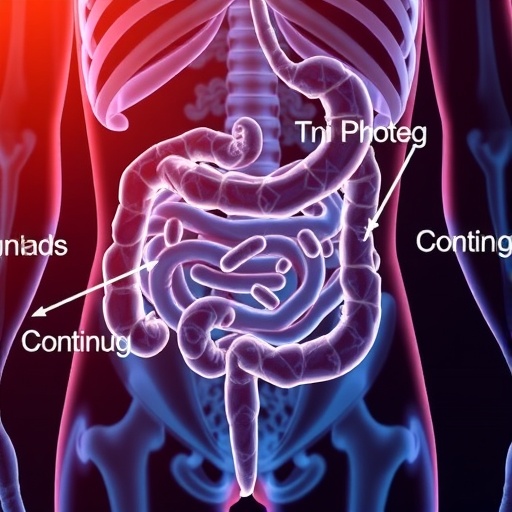In a groundbreaking study published in the Journal of Translational Medicine, researchers have unveiled a pioneering investigation into the role of gut microbiota in arginine metabolism and its potential implications for mitigating intestinal ischemia-reperfusion injury. This topic, rich in complexity, touches on the interplay between microbiota and human health, introducing a novel perspective on how our gut’s microbial inhabitants can influence physiological conditions that were previously thought to be solely related to immediate surgical or medical interventions. The findings of this study are poised to significantly influence both clinical practice and further research in the field of gastrointestinal health.
The gut microbiome, previously underestimated in its significance, has emerged as an essential player in numerous physiological processes. This study emphasizes its crucial role in the metabolism of amino acids, particularly arginine. Arginine is a semi-essential amino acid that plays vital roles in various metabolic pathways and is indispensable for maintaining vascular health, immune function, and wound healing. The newly revealed connection between gut microbiota and arginine metabolism indicates that these microorganisms may have a more profound impact on organ health than previously understood.
Ischemia-reperfusion injury, often resulting from surgical procedures or traumatic events where blood flow is temporarily interrupted, can lead to severe damage to the intestinal tract. At its core, the mechanism involves an initial lack of oxygen during ischemic periods followed by a sudden influx of oxygen when blood flow is restored. This reperfusion phase can incite oxidative stress, leading to inflammation and tissue damage. The findings of this study may offer new avenues for intervention, suggesting that modulating gut microbiota could enhance recovery from such injuries.
In the trials conducted, the team observed noteworthy changes in the microbial composition of subjects pre- and post-exposure to ischemia-reperfusion events. Specific genera of bacteria were found to be strikingly correlated with the levels of arginine-derived metabolites in the bloodstream. These metabolites, such as nitric oxide, are known to play protective roles against ischemic injury, hinting at a direct link between what these microorganisms produce and the body’s response to injury.
One of the fascinating implications of this research is the prospect of developing microbiota-targeted therapies. Rather than solely relying on pharmacological interventions, the focus could shift towards dietary changes, probiotics, or prebiotics designed to enhance the growth of beneficial microbial populations. Such strategies could be a game-changer, especially in patients who are at high risk of developing ischemia-reperfusion injury, such as those undergoing major surgeries or those suffering from chronic vascular diseases.
Another aspect of the study that deserves attention is the exploration of specific bacterial strains that may enhance arginine metabolism. The researchers identified particular microbes that appeared to flourish in the presence of arginine during their experiments. Understanding the mechanisms through which these bacteria thrive and contribute to arginine metabolism could catalyze the development of innovative treatments aimed at orchestrating beneficial microbiome compositions in patients.
Moreover, the study raises questions about the influence of diet on gut microbiota composition and, consequently, on ischemia-reperfusion injury recovery. As food is a primary means of interacting with our microbiome, dietary components could be strategically designed to promote beneficial microbial populations that enhance arginine metabolism. Thus, nutrition could serve as a preventative measure or a therapeutic avenue for those at risk of intestinal injuries during surgeries or due to other medical conditions.
As we delve deeper into this fascinating intersection of microbiology, nutrition, and medicine, the study highlights the importance of a multi-faceted approach to understanding gut health. Traditional medicine often segmented various specializations, thereby neglecting the interconnectedness of the human body. However, the findings suggest that an integrative model that incorporates advances in microbiome research could lead to more effective and comprehensive healthcare strategies.
These revelations also invite further investigation into the scope of gut microbiota influence on other physiological conditions, beyond just ischemia-reperfusion injury. The potential applications stretch across multiple fields, including cardiology, gastroenterology, and even oncology, as we begin to fathom the implications of microbial health on systemic diseases.
While research is still in the early stages, the road ahead is promising. This study represents a pivotal step in understanding the gut’s crucial role not only in digestion but also in systemic health and disease recovery. As we continue to decode the complexity of the gut microbiome and its metabolites, future research can uncover novel interventional strategies that harness microbial properties for enhanced patient outcomes.
In conclusion, the implications of this research are extensive and could pave the way for new standards in clinical practice. As the field progresses, the integration of microbial health into routine medical evaluation and treatment may become commonplace, significantly impacting patient care and recovery processes. The journey toward unraveling the mysteries of the gut microbiome continues, with significant potential for transformative advancements in medicine and health.
As we move forward, ongoing collaborations among microbiologists, nutritionists, and medical professionals will be vital in ensuring that these findings are translated into viable clinical applications. The time is ripe for a revolution in our approach to gut health and its systemic significance, reinforcing the notion that what resides in our microbiota holds the key to unlocking improved health outcomes for countless individuals.
Subject of Research: The role of gut microbiota in arginine metabolism and intestinal ischemia-reperfusion injury.
Article Title: Gut microbiota-derived arginine metabolism mitigates intestinal ischemia-reperfusion injury.
Article References:
Li, X., Hou, M., Lyu, J. et al. Gut microbiota-derived arginine metabolism mitigates intestinal ischemia-reperfusion injury.
J Transl Med 23, 1215 (2025). https://doi.org/10.1186/s12967-025-07225-4
Image Credits: AI Generated
DOI: https://doi.org/10.1186/s12967-025-07225-4
Keywords: Gut microbiota, arginine metabolism, ischemia-reperfusion injury, microbiome, health interventions.




